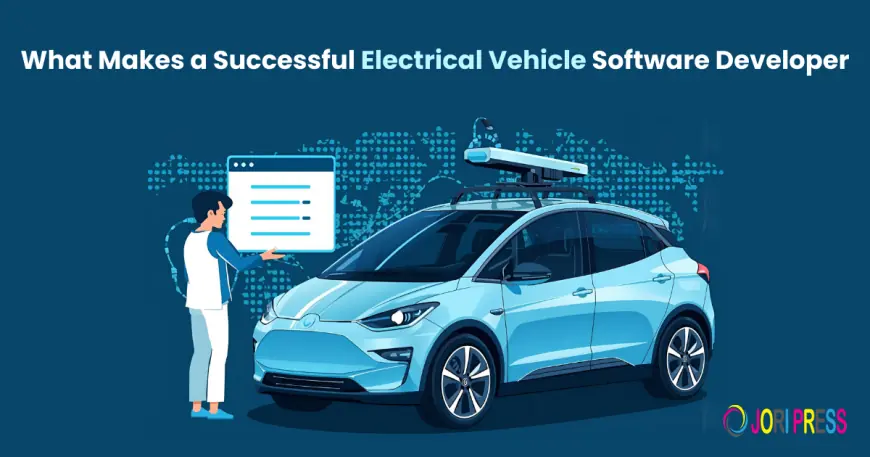What Makes a Successful Electrical Vehicle Software Developer?
Explore the key skills and qualities that define a successful Electrical Vehicle Software Developer driving innovation, performance, and future mobility.

The electric vehicle (EV) industry has moved far beyond being just a trend; it is now the foundation of global transportation’s sustainable future. With governments pushing for zero-emission policies, automotive giants investing heavily in electrification, and startups entering the market with disruptive ideas, the demand for advanced EV technologies has never been higher.
At the heart of this transformation lies software — the invisible yet critical layer that powers battery systems, motor control, infotainment, and autonomous driving capabilities. And the professionals responsible for developing and maintaining these systems are Electrical Vehicle Software Developers.
But what truly makes an EV software developer successful? Is it just coding expertise, or does it involve a broader set of technical, industry, and interpersonal skills? This blog takes a deep dive into every aspect that defines success in this field.
Understanding the Role of an Electrical Vehicle Software Developer
Unlike traditional software engineers, EV software developers work in a cyber-physical environment where software interacts directly with hardware to ensure safety, performance, and efficiency. Their role extends across multiple domains:
-
Battery Management Systems (BMS): Developers build algorithms that monitor a battery’s state of charge (SoC), state of health (SoH), and thermal conditions. These algorithms prevent overcharging, overheating, and deep discharging, which could otherwise damage the battery or even cause safety hazards.
-
Motor Control Systems: Software developers write control logic that optimizes torque, acceleration, and regenerative braking. Their code ensures a smooth driving experience while balancing energy consumption.
-
Embedded Systems Development: EVs rely on Electronic Control Units (ECUs). Developers program these low-level microcontrollers, ensuring that communication between subsystems (like sensors, actuators, and processors) is reliable and real-time.
-
Infotainment and Human-Machine Interface (HMI): Developers contribute to dashboards, digital instrument clusters, and navigation systems, ensuring user-friendly and intuitive interaction.
-
Autonomous and Semi-Autonomous Features: EV developers work with AI and computer vision engineers to integrate adaptive cruise control, lane-keeping assist, and driver-assist features.
-
Cybersecurity: With EVs connected to cloud platforms and charging infrastructure, developers also ensure secure communication and protection against hacking threats.
A successful developer must therefore act as a bridge between hardware engineering, automotive safety, and advanced software programming.
Core Technical Skills Required
1. Embedded Programming Expertise
Embedded systems are the backbone of EVs, and successful developers must be fluent in:
-
C and C++ for system-level programming of ECUs.
-
Python for data processing, prototyping, and testing.
-
MATLAB/Simulink for model-based design — a widely used approach in the automotive industry to simulate system behavior before deploying on hardware.
-
RTOS (Real-Time Operating Systems): Knowledge of platforms like FreeRTOS or QNX ensures deterministic execution of safety-critical tasks.
2. Knowledge of Automotive Communication Protocols
EVs consist of multiple subsystems that must exchange data seamlessly. Developers need to master:
-
CAN Bus (Controller Area Network): The primary communication protocol for in-vehicle networking.
-
LIN (Local Interconnect Network): A cost-effective protocol for less complex systems like windows and mirrors.
-
FlexRay: Used in high-speed, safety-critical applications such as braking.
-
Automotive Ethernet: Essential for high-bandwidth applications like autonomous driving sensors and cameras.
3. Battery and Powertrain Software Development
Battery systems are the heart of EVs. Developers must:
-
Design algorithms for energy balancing across cells.
-
Implement thermal management strategies to avoid overheating.
-
Optimize charging efficiency using vehicle-to-grid (V2G) protocols.
4. Functional Safety (ISO 26262)
-
EVs fall into the category of safety-critical systems, where a single software error can risk human life.
-
Developers must understand ASIL (Automotive Safety Integrity Levels), which define the safety requirements for different vehicle functions.
-
Following ISO 26262 ensures compliance with global safety standards.
5. Cybersecurity for EVs
With EVs connected to cloud services and mobile apps, cybersecurity is critical. A developer must:
-
Implement encryption protocols for in-vehicle communication.
-
Detect and mitigate intrusion attempts.
-
Ensure secure updates via over-the-air (OTA) mechanisms.
Key Soft Skills That Define Success
Technical expertise alone isn’t enough. Since EV projects involve multidisciplinary teams, developers need strong soft skills:
-
Problem-Solving Mindset: EV systems can fail due to both hardware and software reasons. Developers must identify root causes quickly.
-
Adaptability: EV technology is evolving rapidly; staying updated on AI-driven driving systems, EV charging protocols, and energy storage innovations is essential.
-
Collaboration: Developers often work with hardware engineers, AI specialists, and UI/UX designers. Strong communication skills make cross-functional teamwork effective.
-
Attention to Detail: A missed safety check or a poorly optimized line of code can cause catastrophic failures in EVs. Precision is crucial.
-
Innovative Thinking: A successful EV software developer doesn’t just follow industry standards but contributes to shaping new ones.
Industry Knowledge That Sets Developers Apart
EV software developers who thrive are those who understand the bigger picture of the automotive industry.
-
Regulatory Standards: Awareness of global EV regulations (e.g., Europe’s UNECE regulations or US EPA standards) ensures compliance.
-
Sustainability Trends: Familiarity with renewable energy integration, carbon-neutral initiatives, and V2G technologies adds value.
-
Autonomous Mobility: Understanding how EVs integrate with AI-driven navigation systems and cloud-based telematics future-proofs a developer’s skill set.
-
Charging Infrastructure: Developers must know how EVs communicate with charging stations (OCPP, ISO 15118).
Challenges Faced by EV Software Developers
EV software development comes with unique challenges that test a developer’s skills:
-
Performance vs. Safety Balance: Developers must maximize efficiency without compromising on safety-critical operations.
-
Hardware Constraints: Unlike cloud computing, automotive systems run on microcontrollers with limited memory and power. Writing optimized, lightweight code is essential.
-
Cybersecurity Risks: EVs, being connected devices, are vulnerable to hacking attempts. A successful developer prioritizes security.
-
Complex Testing: Real-world driving conditions vary drastically. Simulating these conditions and ensuring robust testing environments is crucial.
Roadmap to Becoming a Successful EV Software Developer
Step 1: Build a Strong Educational Foundation
- A degree in Computer Science, Electrical Engineering, or Automotive Engineering provides the necessary base.
Step 2: Gain Specialized Training
- Certifications in ISO 26262 (safety), AUTOSAR (software architecture), and battery systems are highly valuable.
Step 3: Get Hands-On Experience
-
Participate in student EV competitions (like Formula Student Electric).
-
Work on open-source projects involving embedded systems or automotive software.
Step 4: Continuous Learning
-
Stay updated on AI, machine learning, cybersecurity, and IoT in automotive systems.
-
Learn about V2X (vehicle-to-everything) communication.
Step 5: Industry Networking
-
Collaborate with startups, EV OEMs, and research institutions.
-
Engage in professional forums like SAE (Society of Automotive Engineers) to keep up with industry trends.
Conclusion
A successful Electrical Vehicle Software Developer is not just a coder but a multidisciplinary innovator who understands embedded systems, automotive safety, cybersecurity, and industry regulations. They combine technical mastery with collaboration, adaptability, and industry awareness to drive forward the future of electric mobility.
As EV adoption accelerates, the role of these developers becomes even more critical — ensuring vehicles are safe, efficient, and connected. For aspiring engineers, this is a field of immense opportunities, shaping the sustainable transport systems of tomorrow.
FAQs
Q1. What programming languages are most important for EV software development?
C and C++ are core for embedded systems, Python for testing and AI, and MATLAB/Simulink for modeling and control system design.
Q2. Do EV software developers need automotive hardware knowledge?
Yes. A deep understanding of batteries, sensors, ECUs, and motor controllers is essential to integrate software effectively with hardware.
Q3. Is cybersecurity a major concern in EV software?
Yes. As EVs become more connected, protecting against remote hacking, data breaches, and OTA vulnerabilities is critical.
Q4. What industries hire EV software developers?
EV OEMs (Tesla, BYD, Tata Motors, etc.), Tier-1 automotive suppliers (Bosch, Continental), autonomous vehicle startups, and energy infrastructure companies.
Q5. How can a fresher enter the EV software industry?
By learning embedded programming, pursuing EV-related certifications, working on open-source projects, and gaining hands-on experience with real-time systems.
What's Your Reaction?
 Like
0
Like
0
 Dislike
0
Dislike
0
 Love
0
Love
0
 Funny
0
Funny
0
 Angry
0
Angry
0
 Sad
0
Sad
0
 Wow
0
Wow
0

















































